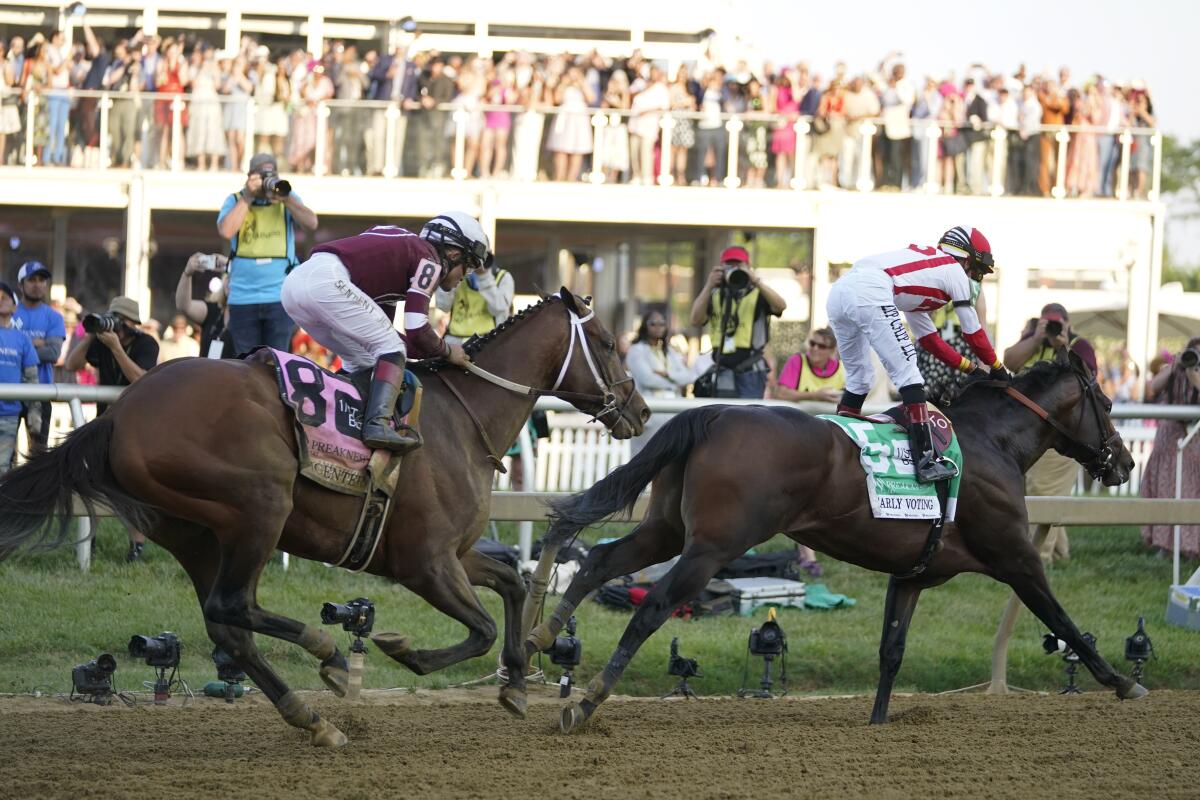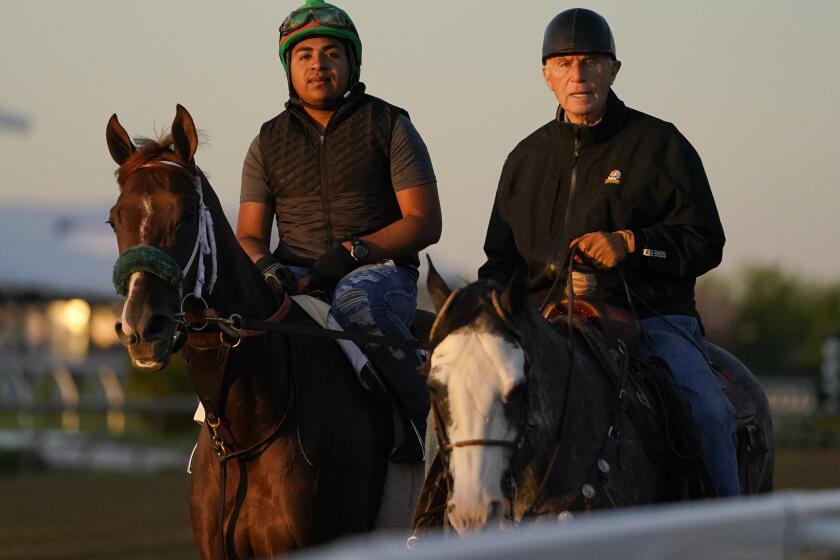Well-rested Early Voting upsets favored Epicenter to win Preakness Stakes

- Share via
BALTIMORE — There is something to be said about going into the Preakness Stakes with a fresh horse, especially when Chad Brown is the trainer in charge.
On Saturday, the lightly raced Early Voting gave Brown and owner Seth Klarman their second win in the middle jewel of the Triple Crown. The colt and jockey Jose Ortiz ran an almost perfect race and held off Epicenter down the stretch to win by 1¼ lengths.
The first time Brown and Klarman mastered the 1 3/16-mile track at Pimlico Race Course was in 2017 with Cloud Computing, who also skipped the Kentucky Derby. Early Voting was making his fourth lifetime start, having last raced six weeks ago in a second-place finish at the Wood Memorial in New York.
“Cloud Computing was a once in a lifetime [horse],” said Klarman, who celebrated his 65th birthday Saturday. “And now I have it twice in a lifetime, which is really hard to believe it could happen. Only with Chad Brown.”
It’s not as if Early Voting were an unknown quantity. He was the third favorite at 5-1 behind Epicenter and filly Secret Oath. During the pre-race jog to post, the colt broke away from the guide pony and galloped confidently down the track. It was a sign he was eager to run.
When the gates opened, Early Voting broke sharply but let Armagnac go to the lead, setting up slightly on the outside of him. The pace was very reasonable with the first quarter-mile in 24.32 seconds. The time at a half-mile was 47.44 seconds. Down the backstretch, it was clear that Early Voting was moving comfortably and moved up within a length of Armagnac.

“On the back side, it just felt like we had been drilling in the morning,” said Ortiz, who won his first Preakness. “We had been working him just next to a horse, and he was very relaxed. I was very confident passing the five-eighths pole. I knew I was in a good spot. I took a peek back. Nobody there. I knew my horse was ready. Chad had him ready.”
Around the far turn, Early Voting started to make his move on the outside and came even with Armagnac. By the time they entered the top of the stretch, Early Voting was in front. Then in the deep stretch, the horse started to veer to the inside, a sign sometimes of being tired. He appeared to go in front of Epicenter charging up the rail, but there was enough clearance and no foul was called.
Brown did little to make people think the horse was going to the Belmont Stakes and in the post-race news conference talked more about the Travers Stakes later in the year at Saratoga. The Belmont is the longest of the three Triple Crown races at 1½ miles.
“I don’t know about a mile and a half in three weeks, but we’ll take a look at it,” Brown said. “I can tell you he’s going to go to Belmont [where he’s stabled], so we’ll start there. But, to win this race on Seth’s birthday, three blocks from Pimlico, where he grew up, he’s one of my very best friends, to be able to deliver a gift like that to somebody, it’s hard to explain to people. On a personal level, very gratifying for me.”
Early Voting paid $13.40 for the win, $4.60 to place and $3.60 to show. Epicenter was second, followed by Creative Minister, Secret Oath, Skippylongstocking, Simplification, Armagnac, Happy Jack and Fenwick.

Early Voting had enough points to qualify for the Kentucky Derby, but Brown chose to wait for the Preakness.
“When you start participating in the Kentucky Derby, you realize what a tough race it is with 20 horses,” Brown said. “As the trainer, you have to deal with the aftermath when it doesn’t work out. Sometimes it’s not pretty. Those horses need time physically or mentally, and it can really cost a good part of your 3-year-old year if you swing and miss.
“This horse just didn’t have the experience. … He [never felt] dirt in his face. He’s a nice horse, but to throw him in a 20-horse field would not have worked out well for him, I don’t believe. It really wasn’t that hard of a decision.”
It was the second straight runner-up finish for Epicenter, who was the favorite in the Derby and Preakness.
“I’m disappointed, you know what I mean?” said Steve Asmussen, Epicenter’s trainer. “Where he was early, and they go 24 and 1 [for the quarter], it just left him way too much to do.”
Wayne Lukas, trainer of Secret Oath, believed the slow pace affected how his filly ran.
Wayne Lukas is hoping that Secret Oath will be the seventh filly to win the Preakness Stakes. It would also be his seventh win in the second leg of the Triple Crown.
“The fractions being slow like that, it was hard to run down,” Lukas said. “She flattened out a little bit in the last eighth trying to do it. It wasn’t her day.”
The Preakness lost some of its luster when Kentucky Derby winner Rich Strike decided to point to the Belmont Stakes. The 80-1 longshot had become a national celebrity with the win, but the owner bucked tradition and decided not to go to Baltimore.
Rich Strike will be back in the spotlight in New York, and the question will start to be answered whether his Kentucky Derby win was a fluke or whether he was a horse that almost everyone misjudged.
More to Read
Go beyond the scoreboard
Get the latest on L.A.'s teams in the daily Sports Report newsletter.
You may occasionally receive promotional content from the Los Angeles Times.












